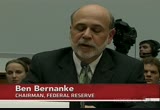tv PBS News Hour PBS July 13, 2011 6:00pm-7:00pm PDT
6:00 pm
captioning sponsored by macneil/lehrer productions >> ifill: refusing to raise the nation's borrowing limit could throw the financial system into enormous disarray. that warning came today from federal reserve chairman ben bernanke. good evening, i'm gwen ifill. >> woodruff: and i'm judy woodruff. on the "newshour" tonight, we get the latest on the negotiations and the proposals to break the logjam over reducing the deficit. >> ifill: plus, ray suarez examines italy's moves to calm fears in europe over its debt crisis. >> woodruff: hari sreenivasan talks to vikas bajaj of the "new york times" in mumbai about the coordinated bomb blasts in india's financial capital. >> ifill: political editor david chalian takes us inside president obama's record- breaking 2012 money haul.
6:01 pm
>> woodruff: paul solman reports on an ohio company that guarantees its workers jobs even during a recession. >> a vast, century old lincoln electric in the heart of the rust belt, workers average $28 an hour and yet there hasn't been a layoff here in at least 70 years. >> ifill: and we check in on how the pentagon is repealing its "don't ask, don't tell" policy starting with the acceptance of gay recruits. that's all ahead on tonight's "newshour." major funding for the pbs newshour has been provided by: >> i mean, where would we be without small businesses? >> we need small businesses. >> they're the ones that help drive growth. >> like electricians, mechanics, carpenters. >> they strengthen our communities. >> every year, chevron spends billions with small businesses. that goes right to the heart of local communities, providing jobs, keeping people at work. they depend on us. >> the economy depends on them. >> and we depend on them.
6:02 pm
>> and by the bill and melinda gates foundation. dedicated to the idea that all people deserve the chance to live a healthy productive life. and with the ongoing support of these institutions and foundations. and... this program was made possible by the corporation for public broadcasting. and by contributions to your pbs station from viewers like you. thank you. >> woodruff: congress and the president got a grave new warning today on what happens if they can't agree on how to cut the deficit and raise the debt ceiling. but republicans and democrats faced mounting internal pressures not to give ground, in the battle over spending cuts
6:03 pm
versus tax increases. the august 2nd deadline to raise the government's borrowing limit loomed ever larger at the capitol today. at a house hearing, federal reserve chairman ben bernanke painted a stark picture of what national default would mean, starting with sweeping spending cuts. the assumption is that as long as possible the treasury would want to make payments on the government debt because failure to do that would certainly throw the financial system into enormous disarray and have major impacts on the global economy. you know, if... i think the worst outcome if we don't raise the debt limit is at some point that we default on the debt and that would create, as i said before, a huge financial calamity which in turn would affect everybody and would set
6:04 pm
job creation back very significantly. >> woodruff: the chairman's warning underscored the stakes as the president and congressional leaders convened again this afternoon at the white house seeking to break their deadlock. much of the talk leading up that session centered on a backup plan put forward yesterday by senate republican leader mitch mcconnell. his proposal would give the president authority to raise the debt ceiling on his own by as much as $2.5 trillion in three installments. it would also require the president to outline specific spending cuts, but would not guarantee they'd ever be made. on the senate floor this morning, mcconnell said the measure was designed to do one thing: >> make the president show in black and white the specific cuts he claims to support. if he refuses, he'll have to raise the debt limit on his own. but he's not going to get republicans to go along with it. that way the president can't
6:05 pm
pretend to support cuts when he doesn't. he's forced to put up. >> woodruff: but divisions within republican ranks were clear. south carolina senator jim demint spoke to cbs. >> what are your thoughts on senator mcconnell's deal? >> well, republicans weren't elected last november to make it easier to spend and borrow and add to our debt. that's not our plan. i've been working with house members and senators. we're going to introduce a plan that would give the president an increase in the debt limit, but it's contingent on cutting spending and capping spending over several years. >> woodruff: on the democratic side, senate majority leader harry reid said he remained open to mcconnell's idea. >> i am heartened by what i read. this is a serious proposal. and i commend the republican leader for coming forward. i believe that the republican leaders proposal, combined with ideas he and i have been discussing to force a vote on deficit reduction proposals, could go a long way toward resolving the impasse in which we find ourselves.
6:06 pm
>> woodruff: other democrats disagreed. new york senator chuck schumer called the proposal a political document aimed at protecting the g.o.p. >> hundreds of members of the republican party throughout the country, scores in this congress, both this house and the other, have said we are not going to raise the debt ceiling. senator mcconnell, realizing the consequences of doing that would fall on the party that doesn't believe it's important to do, had to act. >> woodruff: at the day's white house briefing, press secretary jay carney said the president appreciates mcconnell's effort, but... >> this is not a preferred option. the president is firmly committed to significant cuts in spending and to dealing with our deficit and debt problems in a balanced way. >> woodruff: there was also pressure against compromise from outside groups. the american association of
6:07 pm
retired persons released an ad urging negotiators to back off any consideration of cuts to medicare and social security benefits. >> late today moody's investor service gave notice he's putting the u.s. government's credit rating on review for a possible downgrade. the bond rating agency said there is a "rising possibility" the debt limit will not be increased in time to avoid default. >> ifill: still to come on the "newshour": the european financial crisis spreads to italy; president obama's record- breaking fundraising; the ohio company that won't lay off workers and the military quietly and finally rolls back "don't ask, don't tell." but first, with the other news of the day, here's hari sreenivasan. >> sreenivasan: three bombings in quick succession shook mumbai, india today, killing at least 21 people and wounding more than 100. it was the first terror strike in the nation's financial capital since militants killed 166 people in a 2008 siege.
6:08 pm
vikas bajaj of "the new york times" reported from one of the locations attacked today and spoke with us this afternoon. >> the biggest damage was at the bus stop. it was charred but still standing. there was some damage on the shops across the street, several of them had their glasses shattered and so there was glass all over the street in front of the shop. but mostly it was chaotic mass of people gathering around the police establishment there. hari sreenivasan we're hearing reports that there might have been a fourth bomb? >> there was a fourth bomb discovered in a bag but didn't... had not gone off. >> sreenivasan: what's the indian government been saying about these attacks? >> the indian government says that this is a coordinated terrorist attack. the they're not laying blame at any one group, but they say that the evidence is pretty clear that these blasts were coordinated and these were planned in advance to wreak
6:09 pm
maximum damage and kill as many people as possible given their locations in busy areas and given the timing, at rush hour, that suggests that somebody is trying to inflict a lot of damage on the city of mumbai. >> sreenivasan: is there any lead that the authorities have so far or any groups that have come forward to claim responsibility? >> nobody's come out and claimed responsibility. if the authorities have a lead to a specific terror group, they're not sharing that with the public just yet. >> sreenivasan: have they been preparing for something like this? >> well, in december of last year there was a statement issued by the union authorities saying that they had suspected some members of lashkar-e-taiba, the pakistani terror group, had entered the country and were planning attacks. and specifically they were concerned about attacks during the holiday season in mumbai. we have no idea whether these two... that that warning and this attack today had anything to do with each other.
6:10 pm
they may not have. >> sreenivasan: thank you for your time. >> thank you. >> sreenivasan: in afghanistan, ahmed wali karzai was buried in kandahar, a day after he was gunned down by a close confidant. his half-brother, president hamid karzai, joined thousands of mourners at the service, appealing for an end to the violence. at one point, the president climbed into the grave and broke down in sobs. hours later, a suicide bombing killed five french soldiers in eastern afghanistan. they were guarding a meeting of local leaders. the rupert murdoch media empire news corporation dropped its bid today to take over british sky broadcasting. it was the latest fallout from the firestorm of allegations that murdoch tabloids hacked into phones of celebrities, royals and even murder victims. we have a report from gary gibbon of independent television news. >> reporter: for decades, he's loomed over british politics. feted by politicians, rarely denied his wishes. but today, parliament rose up as one, all three main parties united, telling rupert murdoch he could not expand his media ownership here, right now.
6:11 pm
and he buckled. in a statement on their takeover plans, news corp said that it was too difficult to progress in this climate, but that news corp reserves the right to make an offer at a later date. >> i think this is the right decision, i've been saying that this company clearly needs to sort out the problems there are at news international, at the "news of the world." that must be the priority, not takeovers, so the right >> reporter: it's a huge blow for james murdoch, third in command at his father's company. buying b-sky-b was one of news corp's biggest projects long planned and potentially very lucrative. >> it feels like the parable of the emperor's clothes, all of a sudden everyone knows that rupert murdoch's company was too powerful and we've now got fundamental question about what does media ownership in the u.k. look like going forward. >> reporter: the prime minister said those questions would be answered by and inquiry by lord justice leveson-- which as well is looking into the illegal acts by newspapers and why the police investigation into them failed,
6:12 pm
would also inquire into the relationships between politicians and the press and the police and the press, taking evidence on oath. the moment the public heard the news of the world hacked not just celebrities or politicians, but ordinary families who'd suffered tragic loss, this story changed. and with it, perhaps, permanently rupert murdoch's media ambitions in this country. >> sreenivasan: british police are pursuing their own investigations in the scandal. one involves phone hacking and the other involves claims that murdoch's "news of the world" tabloid bribed police officers for information. "news of the world" went out of business last weekend. the u.s. federal reserve has not ruled out a new round of economic stimulus. fed chairman ben bernanke left open that possibility today in his report to congress on the state of the economy. >> the federal reserve remains
6:13 pm
prepared to respond should economic developments indicate that an adjustment in the stance of monetary policy would be appropriate. the possibility remains that the recent economic weakness may prove more persistent than expected, and that deflationary risks might reemerge, implying a need for additional policy support. >> sreenivasan: bernanke said for now, the fed's forecast calls for moderate growth for the rest of this year. on wall street, the chairman's stimulus comments sparked a rally, but stocks gave up much of the gains by day's end. the dow jones industrial average added more than 44 points to close at 12,491. the nasdaq rose 15 points to close near 2,797. the u.s. will play for the women's world cup soccer championship. the american women beat france today, three to one, in a semi- final match in germany. they'll face japan in the title match on sunday. u.s. women's teams have won two world cups over the years, but have not made it to the finals since 1999. those are some of the day's major stories. now, back to gwen. >> ifill: we turn now to financial woes on the other side of the atlantic as europe's debt crisis spreads, now causing panic in italy. ray suarez has the story.
6:14 pm
>> suarez: across europe and on wall street this week, markets have had the jitters over italy's failing financial health. but today in rome, italian finance minister giulio tremonti sought to calm the fears. he announced plans to strengthen a $57 billion austerity package and speed it through parliament. >> ( translated ): the decree to balance the budget will be reinforced for the entire four- year period, and will be approved by friday. >> suarez: until now, europe's debt fears had been focused primarily on portugal, ireland, greece and spain-- all, countries in economic crisis. italy was originally not a worry with its relatively sound banks and lack of speculation in a housing bubble. now, the eurozone debt contagion has spread. there's concern about italy's high debt and slow growth, and
6:15 pm
political dysfunction between prime minister silvio berlusconi and his long-time rival finance minister tremonti. a bailout seems out of the question. italy has the world's eighth largest economy, so a rescue would be far too costly. as a result, the head of the european central bank mario draghi welcomed italy's plans for swift action today. >> ( translated ): the tensions of threcent days that have affected italian government bonds and stock prices have been also caused by the uncertainty about the prospects of public finance. the budget law presented by the government represents an important step for the process of fiscal consolidation. >> suarez: ireland, meanwhile, was dealt a further blow yesterday when its bonds were downgraded to junk status. that raised questions about the possible need for a second bailout there. european finance ministers have been meeting in brussels this week, and agreed to further measures supporting ireland and portugal.
6:16 pm
but there've been mixed signals about mounting a new bailout for greece, where austerity measures have prompted violent street clashes and repeated strikes. on monday, german chancellor angela merkel pressed for fast action. >> ( translated ): i would like to say that greece must get a new program very quickly, in very, very short order. >> suarez: today, merkel said a planned european council summit on the greek question-- set for friday-- would not be necessary. for its part, the international monetary fund today urged the greek government to do more to get its public debt under control. for more on all this, we turn to two people who have been following the italian and the european financial situations closely. mario calvo-platero is u.s. editor of "il sole 24 ore"-- a national political and financial daily newspaper in italy. and ken rogoff, economics professor at harvard university and co-author of "this time is different-- eight centuries of
6:17 pm
financial folly." professor, as we reported, the concern has been aimed else where, the emergency meetings, the bailout plans. suddenly it's italy. why italy and why now? >> well, i think the proximate cause it was dispute between berlusconi and his very well respected finance minister tremonte. but at a deeper level people are stating to say wait a second, if greece is going to default-- which an increase last week has seemed inevitable--s where it going to stop? why should i keep my none a bank in italy at 1% when i can have in the germany at .5%? that's what's putting the pressure on. >> suarez: mario, is that a good comparison? isn't the italian economy about six times the size of the greek economy? >> will, in a way it is. but, you know, i think we're also have to start to define what default is because there is lots of confusion.
6:18 pm
the markets are very volatile and investors get worried. so, now, for example as part of the negotiations germany and france would like to see the banks take a bit of a cut in their positions with greece which is a fair distribution of a shared cost. now, standard & poor's and moody's come out and says "well, if you do that, that is a default." and so people get increasingly worried. so i think we have to be very attentive at what kind of terms we use. i don't think that italy is going to default. the european central bank is resisting a technical default of greece. so we'll have to see how that goes. but this situation... the situations are very different. italy has a much stronger and better economy than greece. >> suarez: well, mario, other count rise in europe have about a trillion dollars exposure to italian paper. even american banks have almost $300 billion. is italy too big to fail?
6:19 pm
>> well, certainly it is. i mean, if you have to think about a rescue package for italy no one today has the money to put it up. i mean, let's face it, as you said before, italy is six times the size of greece. so i think that everybody should be quite calm. today the markets were doing much better. it's true, as ken was saying before, part of the confusion arose because of a fight over an internal political fight between berlusconi and finance minister tremonte. but the decree for a large austerity plan was already passed. and it was because of this fight that the markets feared that maybe this decree was not going to be approved by parliament. today the situation has been clarified. by friday this package will be passed and, you know, italy is going to go on by adopting this plan and by 2014 it will have a
6:20 pm
balanced budget which is going to be quite an enviable situation if all of this will go according to plan. >> suarez: professor rogoff, the news of the austerity plan seemed to have calmed really jittery markets, but was it ever thinkable that italy could fail? it's got big multinational corporations, highly productive work force, products people want to buy. why was there so much concern at the first sign of trouble? >> well, the thing is, there's been a big ratcheting up after the european debt crisis of the last few weeks. a while ago people were saying, well, the e.c.b. says greece needn't default. the europeans say they're going to back them. the i.m.f. says it's going to be okay. and i think nobody thinks that now. the handwriting's on the wall. it's very clear greece will default. even the i.m.f. has said that. and defaults are always partial, by the way, in sovereign debt
6:21 pm
cases, they're not typically whole. and then people ask, well, what happens to portugal? what happens to ireland? will these countries stay in the euro? and if they li the euro, they're going to depreciate their new exchange rates and suddenly spain won't be competitive. what happens to spain? f spain goes, what happened to italy. it's a very fragile situation. i think there's been a very weak response by the european authorities where they're always behind the game. they're always too late. and there's a concern that they really haven't aa plan "b" to strengthen the euro after greece defaults. the. >> suarez: well, mario, in order for this all to work the austerity plan has to be accepted and the mechanism, as you described it, these go forward. we saw riots, wholesale civil unrest in greece at the sight of an austerity program. is it going to be better accepted in italy? >> i think so.
6:22 pm
in proportion it's a less strong austerity program than the one that has been adopted by greece. the position is coming to help the government and it's just going to be a matter of convincing market t markets that are very often overreacting on short term redictions that this is going to be all right. and you know, the contagion is true. as ken was saying, the contagion goes on and that to a certain point once... if the markets will keep going, you know, one after the other to the weak countries, then in the end they will even arrive to the united states. i don't know what ken thinks about this, but the u.s. is certainly not in a very good position these days and the market will attack it if we are not going to find soon here a budget agreement to cut the deficit. >> suarez: how about that, sflof what's the down side for the united states in continued european fiscal unrest? >> i think there's no comparison yet between europe and the united states.
6:23 pm
and i agree with mario that eventually if we don't do something about our budget deficits and our rising debt it will come to us. but right now everyone wants to give the united states money. we're trying to move proactively to stem a problem in the future. and europe we have not seen the details of a realistic plan which i think has to involve much more fiscal union, political union in europe. i don't think the current status quo is tenable. i think that's very, very clear, and it's not yet transparent how they're going to move ahead. so it's a very fragile situation even though it at the surface it's okay. and by the way, about the austerity package, there's a bank-run danger near if you lose confidence, if people lose confidence in the italian banks, what are they going to do? that's the big risk in europe. >> suarez: well, mario, you heard ken rogoff describe a situation that sounded like the euro having the possibility of unraveling. do you think that's a
6:24 pm
possibility? >> well, there is lots of talk on how europe is going to deal with this and there is talk about a two-speed euro. a few count wrez w the kurnlt euro and some other countries with the less stringent attachment to the euro. the question here is, as ken was saying, it's political. if europe is able to show one single face on this issue then it will do much better to dwins the markets that things are under control. i do not believe for a s.e.c. that there will be a run on the italian banks. they're relatively solid. the saving rate in italy is very high at the private level. the debt is very high, 120% of g.d.p., but there is a plan to reduce it, of course. so i don't think... i mean, you know, we have an italian who's going to be the next governor of the european central bank.
6:25 pm
i've known him for many years. i'm sure that he will make his mission to keep the euro maybe a little bit more flexible but to keep it as one currency. we need large currency in this process of globalization and can i tell you something? if something would go wrong on the euro, i bet that china will intervene and help the euro. >> suarez: mario calvo-platero and ken rogoff, gentlemen, thank you both. >> thank you. >> ifill: now to 2012 politics-- president obama's busy fundraising schedule appears to be paying off. the obama campaign announced today that, combined with the democratic national committee, it raised $86 million over the last three months. that record-breaking total leaves his republican competitors in the dust. as we reported last week, the entire g.o.p. field combined raised a total of $35 million- $40 million. here now to help us go inside the numbers is "newshour" political editor david chalian.
6:26 pm
david, welcome back. hui does the president's fund-raising measure up? >> well, you've got to call a win a win. it is a record-breaking number, as you said, that $86 million. but notice how the campaign is putting it out there in this top line. they want to show that combined dean see and obama campaign number because those are the kind of events-- combined events-- that the president has been doing. they invite a donor to donate both the maximum amount, $5,000, to the campaign and the maximum amount north of $30,000 to the d.n.c. and that's why they like that big total. but, listen, this is the power of incumbency. you would anticipate the incumbent president is going to be able to fill ballrooms and raise more money than these challenges. >> ifill: let's compare this apples to apples. the last incumbent president trying to raise money for a reelection campaign, george w. bush, 2003, how did he do compared to this? >> that's the record they were trying to break. if you look at what bush/cheney
6:27 pm
reelection combined with the r.n.c. did at this time in 2003, that was around $60 million. that's why the obama campaign set a public goal of a combined $60 million. of course, you only set goals to exceed them and in this case everybody expected them to come in north of that. howeverly say to compare apples to apples again, as you say, george w. bush as the incumbent president in the third quarter of 2003-- just for his campaign, not combined with the r.n.c.-- raised $50 million. as you just said, president obama, just for his campaign, raised $47 million. so he has not broken the sort of single quarter fund-raising for an incumbent president. >> ifill: you sat here last week david, and talked about how republican totals had not lived up to expectations, at least their own expectations as far as we know because there's still some out there. does this prove that the economy was really lagging? which is what some republican hopefuls have been saying when the president can raise this much money from this many people?
6:28 pm
>> you know, the president's campaign manager was asked exactly that, about what kind of effect did the downturn in the economy have on fund-raising and he said no, it didn't have too much. but, of course, the entire focus of the campaign rolling out this number is to try to show some enthusiasm at the grass-roots level. they don't... they want to have it both ways, gwen. they want to post a big record-breaking fund-raising number but they don't want to sort of own up to the fact that a lot of that are high-dollar donors, people bundling money together. >> ifill: we don't know how many of those there are. >> we don't get that breakdown until that 15,000 page report gets filed on friday. >> ifill: but they want us to know about how many small donors they have. break that down. >> look at these metrics they put out there today about their fund-raising. 552,000 individual donors gave over the last three months. 260,000 of those are new donors, did not donate to the campaign last time around. the campaign is very excited that there are hundreds of thousands of new people coming into the process. 98% of their contributions, $250
6:29 pm
or less and this the average contribution was $69. but, gwen, when you look at that 98% of contributions $250 or less, we don't know what percentage of the raw dollars came from those small donations. they're being very careful... >> ifill: that 2% could be a lot. >> those could be really high rollers. and there's no doubt that this first fund-raising quarter, this is where you get that low-hanging fruit. there's no doubt that the big-money folks will dominate this. >> ifill: one of the things the democrats made the point of today was saying even though we've waysed this money-- this is a way to get people writing checks-- we're nothing compared to the outside groups republicans will bring in to raise lots of money on their behalf. accept that for a moment. aren't the democrats doing the same thing this time? >> no doubt about it. they said they're expecting $500 million worth of attack ads from outside republican allied groups and that they demand disclosure about where those donors are coming, these shady outside group but they completely ignore the fact that barack obama's own deputy white house press secretary bill burton has left the white house and set up such
6:30 pm
an outside group to help his reelection campaign and fight back against these republican attacks from the outside. >> ifill: aside from unions who have been raising mostly for democratic candidates. >> and you can raise from corporations, unlimited now after citizens united. >> ifill: and these other outside groups, i'm very curious about whether they are now splitting their support among all these republicans who are running now, there's so many in the race or is all the outside democratic groups going to one guy? >> that's a great question because that's part of his advantage. the president doesn't have a primary so all this money he has raised and put out there, this is all to build an infrastructure and organization and prepare to defend against attacks in this next year before he's in a one-on-one race with somebody. on the republican side right now those outside groups are spending their money attacking the president. right? they will get behind the republican nominee, which is why no matter how much big fund-raising win this corporate quarter is for the president the republican nominee, nor president obama, is not going to win or lose this election based on how much money they have.
6:31 pm
>> ifill: david chalian, as always, thank you. >> sure. >> woodruff: now, as the unemployment rate remains stuck above 9%, "newshour" economics correspondent paul solman looks at a cleveland company that has handled economic turmoil very differently. the manufacturer hasn't laid off anyone for economic reasons since world war ii. our story is part of paul's ongoing reporting "making sense of financial news." >> reporter: a bright light in rust belt america: lincoln electric, making welding equipment in cleveland for over a century. four million u.s. factory jobs lost in a decade, a quarter million in ohio alone. yet here, they protect jobs, and did so even through the crash of '08, says c.e.o. john stropki. >> we did not lay off any of our
6:32 pm
employees during that tremendous recession. >> reporter: that's because after three years, workers here are guaranteed at least 30 hours a week as long as they continue to meet quality standards. journalist frank koller is author of "spark," a book about the firm. >> every c.e.o. when it comes time to announce a layoff always says two things, first: our employees will remain our most valuable asset, even as we lay off 10-15% of you. but second: we have no option. the lincoln electric example does provide evidence that it is possible to protect people as well as profits. >> reporter: lincoln has made money in every year of its history save two, and it keeps growing. its cleveland facilities span almost a mile. it now boasts one of the biggest wind turbines in north america, and the company has operations in 19 countries. so, how does lincoln do it? through its so-called "incentive management" system, first
6:33 pm
chronicled back in 1951 by james lincoln, the brother of the founder. to see how the place works, we now donned our safety apparel: steel toed shoes, ear plugs and ventured out onto the factory floor. first, workers are not paid by the hour, but by output. the piecework system once common in manufacturing america. kim mattina has been a pieceworker at lincoln for seven years. >> other people would like it to be on an hourly job where there's no pressure and you get paid no matter what they do. >> reporter: here, the pressure's always on because if you don't do, you don't earn. and since time is money, even lunch breaks become too costly. brad barnes eats at his work station. >> i like to be close to my work and get done eating and get right back to work again. >> reporter: so this is an efficiency move on your part? >> yes, yes.
6:34 pm
>> reporter: how many people here in the factory, what percentage do what you're doing? >> i'd say more than half. >> reporter: furthermore, overtime is the company's decision, not yours: the amount of work dictates the length of the shifts. 15-year veteran john fazi: >> it's long hours. when you get busy, you get busy. so you've got to take the good with the bad. >> reporter: but the bad is getting paid overtime. >> yeah, but sometimes it's not being with family. you know, little daughter and all that. >> reporter: normal work week: 45 hours. the aim is to hire the hardest workers around. c.e.o. stropki first came to lincoln as a summer pieceworker to pay for college. >> if i worked harder, i could make more money than somebody who'd been here for 20 years or 30 years who wasn't working as hard. >> reporter: i'm pleased to offer you a job in our factory. pay estimate at $3.20-$3.80 an hour. stropki made far more, even when the plant was on holiday.
6:35 pm
>> in the vacation time i came in and swept the floors in the factory so i could keep earning those wages during that time too. >> reporter: while workers at lincoln today work hard to produce as much as they can, the piecework rate is forever being cut to reflect productivity improvements. >> nobody wants to get their prices cut but it's usually for a reason. >> reporter: you figure it's fair enough. >> it's fair enough. i mean, you have to be fair to the company, for the company to make money. >> reporter: but wait, why care about the company making money? because in exchange for the rigors of piecework come job security and profit sharing. though its stock is publicly traded, lincoln sets aside a full third of earnings for a bonus pool. >> and that is shared by all full-time employees based on their wages earned during the year and then based on their performance, if they make more parts, they get paid more. if they help us generate more profit, they get paid more for it. we have 25 pieceworkers last
6:36 pm
year make over $100,000. the average worker makes $68,000 a year. but note that stropki says the bonus is tied to performance. that's a rating, given by your supervisor. those who rate very low over a long period of time, either quit or can be fired. >> reporter: the rating is another form of internal competition. and yet one of the things you're rated on: your cooperativeness. journalist frank koller: >> i think what lincoln electric is doing is striking a balance between competition at the individual level so that each individual worker is trying to do the most and as a result earn the most for himself, and the need for cooperation where each worker is also very, very clear that he can't, or she can't work on their own, they need to work together at the same time. >> reporter: stropki says cooperation scaled new heights
6:37 pm
during the crisis year, when lincoln's sales dropped by a third. >> we had to pull out all the stops based on the severity of the recession and if you look at going from 45 hours to say 30 at an extreme, that's a pretty big contraction. we offered a very modest early retirement program and their attitude was, "i've been here, i've gotten mine, it's time for me to provide that same kind of opportunity for others." >> reporter: you're almost choking up, right? >> yeah, i am. you know, when you see people willing to give up something for others, that is something special, yes. >> reporter: the lincoln system is intriguing enough that foreign firms regularly traipse through, says manager frank sue- fer. >> i think the chinese people that were here were a little bit surprised. the fact that we haven't laid people off is kind of a shock to them. >> reporter: hey, even we traipsed here, 19 years ago, and profiled lincoln for the "newshour." eight cases on the firm have been written at harvard.
6:38 pm
there are james lincoln's books; frank koller's. so why don't more firms do as lincoln does? >> this system is harder to manage than other systems are. to have to come in, in the worst of a recession or depression, and think about how you're going to preserve the jobs of 2,000- 3,000 employees is not an easy system to manage with. >> reporter: pieceworkers say the systems also too tough for most workers. >> i know personally nobody in my family could do the job that i do. i would think maybe only a third of the people out there could survive doing piecework. >> reporter: novella todoroffs been at lincoln for 12 years. >> we have a lot of people that do come and they don't make it. >> reporter: and they don't make it why? >> because we're hard workers. >> reporter: harder than the average. >> yes. much harder than the average. >> reporter: frank koller says the u.s. labor movement may also
6:39 pm
be partially responsible, long ago opting for income security over the job security at non- union lincoln. >> income security implies that you're guaranteed a certain hourly wage. let's say in an auto factory in detroit, the idea of employment security is that you will always have employment but that in tough times because the company is not doing so well, your income is going to decline and that in good times it will increase again. now ultimately the idea of income security won out. >> reporter: as did, on wall st., the idea of income for shareholders. harvard business school professor norm berg, who's taught lincoln as a case study for decades, says wall streets increasing stress on maximizing shareholder value has fought the profit-sharing, no-layoff model. >> if you ask the financial community, they would say this is practically traitorous. it's like a bumblebee, it's not supposed to fly, you know?
6:40 pm
>> reporter: or, as a wall street investment banker said of the firm: >> "i'd love to get control of this company. i would cut the costs, layoff people, refinance, and make a lot of money." >> reporter: and yet, here's the actual bottom line: for more than a century, lincoln electric has made money the old fashioned way and is on track for $200 million in profits in 2011, while offering its workers essentially lifetime employment, in still somewhat rusty cleveland, ohio. >> woodruff: next an update on gays serving openly in the u.s. military. it's been more than six months since congress repealed the 1993 "don't ask, don't tell" law barring openly gay service. the pentagon is working on plans to implement the new policy, but last friday, a u.s. court of appeals ruled the old law
6:41 pm
unconstitutional. it gave the obama administration until next week to accept or appeal. meanwhile, a top pentagon civilian official has told the armed services to process applications without regard to sexual orientation. for more on what's next for current and prospective openly gay service members, we go to mark thompson is "time" magazine's washington deputy bureau chief. and aubrey sarvis is the executive director of the service members legal defense network, which advocates in favor of lifting the ban on gays in the military. we thank you both for being here. mark thompson, to you first, though. where do things stand with "don't ask, don't tell"? >> well, judy, we basically have two trains rushing to the same station, i think, in a matter of weeks, "don't ask, don't tell" will be history, one train is the pentagon certification process which has been under way for several months and it's
6:42 pm
designed to train troops to accept openly gay men and women in their ranks. basically the pentagon made clear today, you know, we don't have to train 100% of our troops to certify, you have to be sure to get to that destination. and it seems like they'll be on their way to doing that. and the appellate court in california, the appellate court has basically said as of friday, as you pointed out, this law is unconstitutional. the world hasn't fallen apart in the last several days because "don't ask, don't tell" is no longer being enforced but the fact is that now in our military it is not being enforced and the question is going to be which one is ultimately going to carry the day and maybe they'll merge and it will happen together. >> ifill: well it sounds confusing to people who don't follow this closely, aubrey. do you share this sort of two-track analogy here? >> oh, absolutely. years ago at s.l.d.n.-- service members legal defense network-- to file litigation challenging
6:43 pm
the constitutionality of "don't ask, don't tell." at the same time we made the decision to lobby congress, the white house, and the pentagon for repeal to remove legislation to repeal this law. but back to mark's point. it's true. we have the court of appeals for ninth circuit saying to the pentagon on monday come back and tell us if you and the justice department intend to continue arguing that "don't ask, don't tell" is constitutional. and as mark also said, that same court a few days earlier stopped the pentagon from enforcing "don't ask, don't tell." but there is confusion on the ground. service members are confused and i would suggest that is the court is somewhat confused. >> woodruff: so how is the administration responding to this court ruling? has it said yet? >> basically you've got a ping-pong ball here and the justice department and department keep batting it back and forth. they're trying to figure it out.
6:44 pm
if you read... some folks are saying i think the administration will fight the court ruling and will. but fundamentally, that's going to be a problem because why are they going to fight it to maintain it when the day after tomorrow they're likely to get rid of it. so i think politically ultimately they're going to have to decide that this really isn't worth the fight. they can probably do that if they decide to certify before the ten-day deadline and the court comes next week. >> woodruff: cert why in? >> that they are ready to allow openly gay men and women to serve. >> woodruff: so this is jumping ahead of what the court does. >> they need to certify to the congress that they are ready to issue that letter to capitol hill and i think it will be sent to the court of appeals in the ninth circuit. and this certification is very simple and straightforward. allowing gays and lesbians to
6:45 pm
serve in the military will have no adverse impact upon the armed forces. the solution here is the certification and that should be issued in days. then 60 days will run and that will be the end of "don't ask, don't tell." >> woodruff: has it taken a longer time than was expected to get this certification? >> i think the certification process has become overly bureaucratic, protracted and, to some extent, this delay process has caught up with the pentagon. >> woodruff: what do you mean? >> well, i think my reading of what was going on to some extent and the court's order was if you're going to continue to enforce "don't ask, don't tell," we're issuing this order to stop you from doing so. and not only that, you need to come back in ten days and tell us if you intend to argue that this law is still constitutional
6:46 pm
>> woodruff: is the administration position in all this, mark thompson, clear or snot >> well, no, it isn't. that's parent of the problem. now go back to aubrey's point of this as being overly bureaucratic and protected, this is the u.s. department of defense. they don't this kind of thing fast and i think the pentagon has taken some pride in the process they set up and the surveying they did. if you talk to gay troops, as i have, sure they want it done faster but they seem pleased ultimately they they know the destination they're bound for and so most of them are keeping quiet about it. >> woodruff: so what is the situation right now, aubrey sarvis, if you're someone interested in enlisting in the armed services and you're openly gay, are you welcome to do that or not? what is your organization? >> we're hearing from individuals in the field who are going down to recruiting stations to enlist.
6:47 pm
their applications are being accepted. they are being processed. we heard this afternoon from the navy that they are receiving those and those service members i believe will be welcomed. but the answer here is 203 days for this certification process is too long. there's confusion among the troops and we need to end it. the fact that you would have to ask that question indicates that not only do the individuals who want to join are not clear, some of the recruiting stations are not clear on their marching orders. again, the answer is certification in days not weeks. >> woodruff: do you have the same answer to that question if it were an openly gay individual? can they or can they not enlist? >> yes, they can. but number one "don't ask, don't tell" is still on the books so it can always come back to bite you. some of the groups are advising folks keep your mouth shut so
6:48 pm
long as this law is on the books do not come in broadcasting that you're gay. the law will be changed sure enough and then you can be open. >> and that is our legal counsel to service members. do not come out today we still do not have finality. >> woodruff: what are we looking at in terms of a timetable here? you have talked about days? weeks? what's the sense, mark? >> i think the ten-day clock runs out a week from tomorrow. i think certification will happen before then. >> it may not. i think... i think it should. it could be late july, it could be early august. but we do need to end this confusion, the sooner or t better. >> woodruff: sounds like we may have to revisit this again and ask some of these same questions again. aubrey sarvis, mark thompson, we thank you both. >> thank you. >> ifill: again, the major developments of the day: federal reserve chairman ben
6:49 pm
bernanke warned that a government default could roil the financial system, and hurt job creation. coordinated bombings in mumbai, india killed at least 21 people and wounded more than 100. and media baron rupert murdoch dropped his bid to take over british sky broadcasting, amid allegations of phone hacking by his tabloids. at the "newshour" online, we've posted a story tonight about child marriage-- a practice that is far more common than you'd think. hari sreenivasan speaks with a photographer who has investigated the phenomenon across several continents. >> sreenivasan: more than 50 million girls under the age of 17 are already married in developing countries and 100 million more are expected to marry in the next decade. photojournalist stephanie sinclaire has traveled documented the practice of child marriage. over the past eight years she's gained intimate access to families and child brides who can be as young as five years old at the time of marriage. her photographs were recently featured in "national geographic" magazine in a story
6:50 pm
called "too young to wed." she joins me now. thanks for being with us. >> thank you for having me. >> the story of the five-year-old little girl in india that was being led off to her wedding was so powerful. you were looking at that girl while she's being carried on her shoulders just like any other five-year-old girl would. what would that... what was that scene like? >> yeah, that was a very, very intense situation. it was a wedding that was held at about 4:00 in the morning. and they held in the secret because it's technically illegal to have underage marriages in india. but it's not really enforced but just out of protection, especially when they're very young like that they have them in the middle of the night. and the girl was sleeping, she had gone to sleep much earlier and they literally woke her up and put her over the uncle's shoulder and took her to her wedding. >> sreenivasan: what are the key drivers behind it? is it just about geography? country from? religion? why is it still happening? >> it's happening for a lot of reasons. i would say the primary one is
6:51 pm
still poverty. it happens... in my experience i've seen writ there's lack of communication, lack of roads, lack of schools. so these are parts of the world where it's not very developed but there's other... there's traditional issues are involved. there are... religion has always been a justifyer in almost every situation i've been in regardless of whether it was islamic or hindu or christian weddings. there was some sort of justification why it was allowed to happen. and that's what makes this issue such a difficult one to deal with. one that's a bit taboo. people don't want too get involved because they feel like, oh, well, this might ruffle feathers. is. >> sreenivasan: so many of these girls are not educated at all. there's a paragraph that says nurses were in some circumstances describing reproductive health practices while a young girl was in active labor, just telling her what was
6:52 pm
going on. >> this is true. i spoke a gynecologist in this area of yemen and she told me that most of the girls had no idea what was going on with their bodies. they knew very little about reproductive health. i spoke to an eight-year-old girl who is sexually active with her husband who's in his late 20s, early 30s, and she didn't have any idea how babies were made she just thought you get pregnant and have a baby but she had been to only a few years of school and didn't have an opportunity to learn them from anybody. >> sreenivasan: has a reporter and photographer, how did you develop a level of trust where you could be so intimate with these characters? >> well i've been working on this project for a long time. so i've been able to show people in the communities the work i've already done and they can see that... i hope they can see that it's been done with respect and care for the communities and
6:53 pm
care for the people... the girls in the situation but also the people who want this practice to stop and every time that i've been granted access it's because there was someone within the community... within those families who were willing to grant us permission who didn't necessarily like the practice but just felt like it was beyond their control, they had to participate so they wanted their voices to be heard. i had one mother in afghanistan who... i photographed the engagement of an 11-year-old girl to a man in his 50s and the mother was crying and telling me "we don't have enough food to feed the rest of our children, we're selling our girls." so, i mean, the families want attention to this issue, at least on some level. either through... because of they're worried about poverty, lack of education and not having any other options or because they, too, were married at very young ages. >> sreenivasan: is there a community-based solution working in some of these communities?
6:54 pm
i think the knee-jerk reaction, people say "gosh, can't we take them out and immediately rescue them somewhere?" is there something more systemic that's working? >> for sure schools are the best answer. but it's not just schools for regular education. i think educating the societies, those communities as villages about reproductive health, about the consequences of early marriage are just as important as regular primary education. in yemen one of the biggest issues is they have... they don't have many schools and the once they have have very few women teachers. and so the young girls can't go go because there's no women teachers. it's difficult but i think education of the communities on an education level for the children and families is important. >> sreenivasan: stephanie sinclair, the story is in national geographic magazine called "too young to wed." thank you for your time. >> thank you for having me. >> woodruff: stephanie sinclair's story was part of the
6:55 pm
untold stories project at the pulitzer center for crisis reporting. you can find more of her images and stories by following the link on our website. >> ifill: and that's the "newshour" for tonight. on thursday, we'll look at the new defense department policy on responding to cyber attack. i'm gwen ifill. >> woodruff: and i'm judy woodruff. we'll see you online and again here tomorrow evening. thank you and good night. major funding for the pbs newshour has been provided by: and the william and flora hewlett foundation, working to solve social and environmental problems at home and around the world. and with the ongoing support of these institutions and foundations. and... this program was made possible by the corporation for public broadcasting. and by contributions to your pbs station from viewers like you.
6:56 pm
191 Views
IN COLLECTIONS
KQED (PBS) Television Archive
Television Archive  Television Archive News Search Service
Television Archive News Search Service 
Uploaded by TV Archive on

 Live Music Archive
Live Music Archive Librivox Free Audio
Librivox Free Audio Metropolitan Museum
Metropolitan Museum Cleveland Museum of Art
Cleveland Museum of Art Internet Arcade
Internet Arcade Console Living Room
Console Living Room Books to Borrow
Books to Borrow Open Library
Open Library TV News
TV News Understanding 9/11
Understanding 9/11


























































